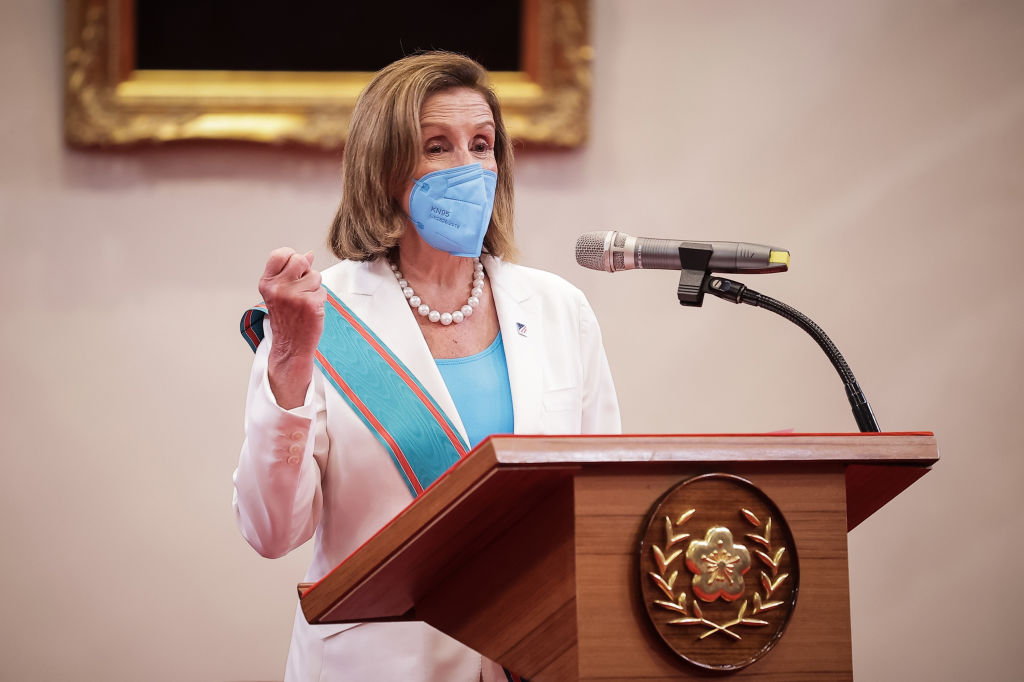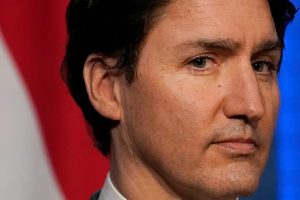Pelosi goes rogue
Is Nancy Pelosi the Margaret Thatcher of American politics? Jacob Heilbrunn makes that mischievous claim in his defense of the speaker of the House’s Taiwan visit on the site this morning. While I certainly wouldn’t go that far, Jacob is right to identify Pelosi’s personal stubbornness, her sheer bloody-mindedness, as crucial to understanding her decision to head to Taiwan in spite of White House advice to the contrary. It seems that the lady’s not for turning.
And so it was that Pelosi became the most senior US official to visit the island nation in a quarter of a century, emphasizing America’s “ironclad” determination “to preserve democracy here in Taiwan and around the world” in her meeting with Taiwan’s president Tsai Ing-wen, and prompting an escalation of Chinese military activity, including live-fire drills and an incursion into Taiwan’s territorial waters. A Chinese foreign ministry spokesperson called the trip a “gross interference in China’s internal affairs” and warned of “firm, powerful and effective” counter-measures.
Should Pelosi have made the trip? Needless provocation or important assertion of American strength and democratic solidarity? I tend to think it’s the latter. To cancel the trip after Chinese hyperventilating would have been to fall for an adversary’s bluff and, crucially, to accept the premise of Beijing’s objections.
Not that Pelosi’s trip was without its problems. A theoretical trip to express support for Taiwan and the trip undertaken by Pelosi — which brought with it a rift with the White House, scheduling confusion and an unwelcome will-she-won’t-she build up — are not the same thing. The move may have had broad support on the Hill, including from twenty-five Senate Republicans (Mitch McConnell among them). But it was unhelpfully undermined by the Biden administration, whose decision to publicly pour cold water on the idea of a visit helped turn the opportunity for a display of steadfast support and solidarity into something much more muddled.
Pelosi’s decision to go ahead with the visit after Biden had stated that military officials warned it was “not a good idea right now” has made America’s president look weak and exposed the contradictions and ambivalence at the heart of the current administration’s China policy. But perhaps that might ultimately prove constructive, with the rift between Biden and Pelosi also making clear the gap between the speaker’s commitments and America’s capabilities, underscoring the urgency with which it should be closed.
*** Sign up to receive the DC Diary in your inbox here ***
The never-ending fight for the future of the GOP
Another primary election night, another ambiguous set of results when it comes to the future of the Republican Party. It’s hard to score the Missouri Senate primary, one of last night’s most-watched races, given that Trump issued a last-minute endorsement of “Eric” in the contest between disgraced former governor Eric Greitens and the state’s attorney general Eric Schmitt. Elsewhere, Trump-endorsed Blake Masters won a comfortable victory in the Arizona Senate primary. But, as Ben Domenech explains, looking at the results through a Trump-versus-non-Trump lens only gets you so far. Of the Trump-backed candidates, he writes:
This glosses over the more complicated truth about the differences between these candidates in terms of substance and political allegiance. Some are truly anti-Washington, at odds with the unpopular party leadership of Mitch McConnell, while others only give lip service to anti-Washington tropes. Some represent a true break with the pre-Trump past of the GOP, while others are more interested in merely adapting to a new populist reality, giving up as little as possible of their pro-business support.
Yes, the midterms will reveal a lot about Trump’s enduring power over the party, but that issue obscures the extraordinarily open-ended question of what, in terms of ideology and priorities, the Republican Party in the Senate will look like after the dust has settled.
OPEC humiliates Biden
After Joe Biden went to Saudi Arabia last month, the president’s spokespeople pleaded for patience when it came to judging the results of that trip. More specifically, administration officials insisted that only after the next meeting of the OPEC oil cartel would the effects of the president’s oil diplomacy be felt. Well, that meeting took place today, and the outcome is more than a little underwhelming. The twenty-three-nation OPEC+ group announced that it would release an extra 100,000 barrels of oil a day in September. That might sound like a lot, but it isn’t in the context of global energy needs. In fact, as Bloomberg reports, it is one of the smallest increases in the cartel’s history as well as a lower number than the extra supply added in July and August.
What you should be reading today
Ben Domenech: Why the pro-abortion left won in Kansas
Birdie Hall: How LSD helped me find God
Rikki Schlott: Why I joined the college exodus
Editorial Board, New York Times: A cynical low for the Democratic Party
George Packer, the Atlantic: Remember Zawahiri’s victims
Tanner Greer, Scholar’s Stage: Has technological progress stalled?
Poll watch
President Biden job approval
Approve: 39.8 percent
Disapprove: 56.0 percent
Net approval: -16.2 (RCP Average)
Supreme Court approval rating
2020
Approve: 58 percent
Disapprove: 38 percent
2022
Approve: 43 percent
Disapprove: 55 percent (Gallup)


















